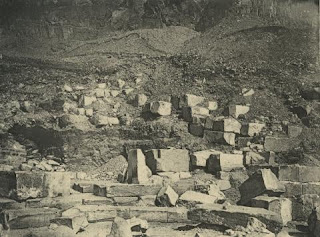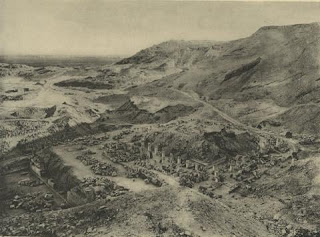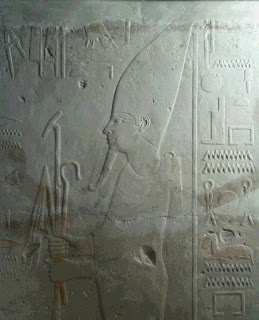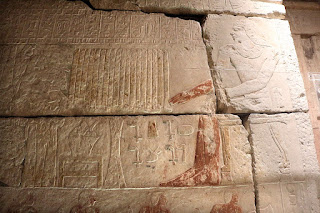The Sphinx of Ramesses II, c. BCE 1200. The 13-ton granite Sphinx was excavated as part of the temple of the Egyptian creator-god Ptah during the expeditions organized by the Egyptian Exploration Fund, under the direction of Sir William M. Flinders Petrie in the ancient Egyptian city of Memphis.
lunes, 28 de febrero de 2022
Dintel con los nombres de Hatshepsut y Tutmosis III
Dintel con los nombres de Hatshepsut y Tutmosis III
procedente del Rameseum. Philadelphia, University of Pennsylvania Museum.
public domain
Rectangular stela with irregular sides. The scenes and texts are applied in paint. The decorated section is surrounded by a simple border. The two registers are separated by a band c. 4.5 mm wide. Outlines and details are all done in black paint. The representations show four colours: male skin red-brown, female skin yellow, hair and lappets black, clothing white. The paint sometimes crosses the outlines. The inscription starts in hieroglyphs but by the end of the first line has turned into hieratic. Just as in the representations, the ink has deteriorated in places, making it difficult to read the text.
ABYDOS
12TH DYNASTY ?
(1) An offering, which the king gives to Osiris, Lord of Abydos, so that he may give water (?) ...
reverence (to ?) the scribe (?) ...
(2) His brother, born of It.
(3) His brother Sa-Montu, born of Sat-tep-ihu
. (4) His son Sa-Montu, born of Khuyt-Sobek.
(5) His wife, whom he loves, Khuyt-Sobek.
(6) The majordomus Khenti-hotep, born of his mother
(7) His wife, whom he loves, It, born of Neferet-...
(8) His [brother] Renes, born of It.
(9) His wife, whom he loves, Sat-tep-Ihu.
(10) The chief butler (?) Khenemu-hotep.
(11) His wife, whom he loves, Sen... (?).
Inventory number 100
KUNSTHISTORISCHES MUSEUM
Hein, I. & H. Satzinger, Stelen des Mittleren Reiches einschließlich der I. und II. Zwischenzeit, Teil II. Corpus Antiquitatum Aegyptiacarum (CAA) Wien 7 (1993), 33-36.
http://www.globalegyptianmuseum.org/record.aspx?id=4502
Fragment of a relief: a man's head
Fragment of a relief: a man's head
THEBES: WEST BANK: DEIR EL-BAHARI
Landa N.B., Lapis I.A., Egyptian Antiquities in the Hermitage. Leningrad, 1974, pl.32.
Landa N.B., Fragment drevneegipetskogo rel'efa. pp.37-39.
domingo, 27 de febrero de 2022
Ankh-auf-Mut Adoring a Seated Osiris
Ankh-auf-Mut Adoring a Seated Osiris, Egyptian, Third Intermediate Period, painting on wood, in the Worcester Art Museum, Worcester, Massachusetts, USA.
public domain
Tomb stela of Nemti-ui
Tomb stela of Nemti-ui. Egyptian first intermediate period. Akhmim (?) H 48.5 cm. Limestone, plaster painted. IN 1875. Roemer und Pelizaeus Museum. "An offering which the king gives (to) Osiris, a funerary offering for the venerable with the Great God, for the Lord of the Private Chamber, the Overseer of the Fields of the Great House, Nemti-ui..." Example of "free-form" or "free-style" hieroglyphs; (Picasso-like). The en:iconography may also be in "free-style". Examples of this "free-form".
public domain
Several ancient Egyptian terracotta, glass and pottery containers and one lion-shaped board game piece
Several ancient Egyptian terracotta, glass and pottery containers and one lion-shaped board game piece, in the Musée des beaux-arts de Rennes, in France. From left to right : Spherical flask (réf. 32.8.08). Date : between the New Kingdom and the coptic period. Alabastron (794.1.144). Date : between the late period and the ptolemaic period. Lion-shaped statuette used as board game piece (D.80.5.51). Glass phial with spherical bottom (D.23.2.175) from Antinoe (Antinoopolis). Glass phial with oblong bottom (D.23.2.100) from Antinoe (Antinoopolis). Two pots (the smaller one : D.23.2.86 ; the bigger one : D.23.2.87). Small mortar (32.8.93).
public domain
sábado, 26 de febrero de 2022
Estela de registro triple de Iourekhy
Estela de triple registro Iourekhy
Museo arqueológico y de bellas artes de Aviñón
Calvet Museum
wigs with cones of unguent, Tomb of Userhat
wigs with cones of unguent, Tomb of Userhat
source: https://wellcomeimages.org/indexplus/obf_images/20/dd/a295340b81c40aa6be06fb21a7c5.jpg
viernes, 25 de febrero de 2022
jueves, 24 de febrero de 2022
Funerary bust of a man
Funerary bust of a man
from El Kharga in Upper Egypt
Roman Period 2nd century CE
Penn Museum
public domain
Bas-relief of Osiris
Bas-relief of Osiris
This fragment of relief comes from the chapel that Amenhotep I had constructed for his father Amosis at Abydos. It represents the god Osiris dressed in the white crown of Upper Egypt. In his hands, he holds three sceptres: the flagellum, the was-sceptre and the heqa-sceptre (crook). The fragment, which contains three hieroglyphic inscriptions, still bears several traces of colours.
Abydos
NEW KINGDOM: 18TH DYNASTY: AMENHOTEP I/AMENOPHIS I/DJESERKARE
Inventory number E.0483
KMKG - MRAH
L. Speleers, Recueil des inscriptions égyptiennes des Musées Royaux du Cinquantenaire à Bruxelles, Bruxelles 1923, 38 nº 140
http://www.globalegyptianmuseum.org/record.aspx?id=105
miércoles, 23 de febrero de 2022
pottery vase
Ovoid, light coloured pre-dynastic Egyptian pottery vase with crimped handles at sides. Designs in red on sides show boat with hut and figure in foetal position, two ostriches, over handles palm tree between two gazelles, waved lines round neck and in field
Harrogate Museums
Part of a limestone funerary stela of the nobleman Amenemhat
Part of a limestone funerary stela of the nobleman Amenemhat who inhales the fragance of a lotus flower, the hieroglyphs above him listing 'offerings of fowl, linen and every good and pure thing on which a god lives, for the ka (soul) of Amenemhat'.
Harrogate Museums
martes, 22 de febrero de 2022
Tomb relief fragment, Mastaba G7911, Eastern Cemetery, Giza,
Tomb relief fragment, Mastaba G7911, Eastern Cemetery, Giza, Egyptian, Old Kingdom, 5th-6th dynasty, 2520-2195 BC, limestone - Middlebury College Museum of Art - Middlebury
public domain
Model jar
Model Jar
procedence: a foundation deposit
KV 42
Tomb of Meritre Hatshepshut or Senefer
Met Museum
dynastuy XVIII
Fuente: metmuseum.org
Stele of Ushumgal.
Stele of Ushumgal.
Period: Early Dynastic I Date: 2900–2700 B.C. Geography: Mesopotamia, probably from Umma (modern Jokha) Culture: Sumerian Medium: Gypsum alabaster Dimensions: H. 22.4 x W. 14.7 x D. 9.5 cm (8 7/8 x 5 3/4 x 3 3/4 in.) Classification: Stone-Relief, Inscribed Credit Line: Funds from various donors, 1958 Accession Number: 58.29
MET MUSEUM.
source: metmuseum.org
V dinastia, ricostruzione della tomba di unis ankh, 2400 ac
V dinastia, ricostruzione della tomba di unis ankh, 2400 ac
Field Museum of Natural History
public domain
Queen's head, , Egypt, 18th dynasty,
Queen's head, , Egypt, 18th dynasty, perhaps late 14th century BC, granite, K 96 - Martin von Wagner Museum - Würzburg, Germany -
public domain


















































